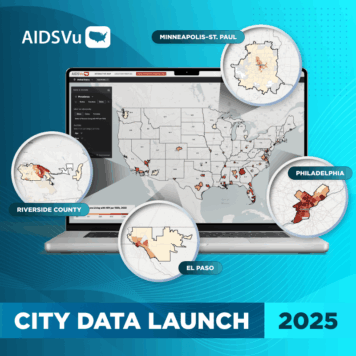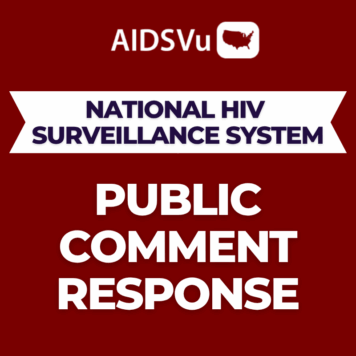The Centers for Disease Control and Prevention (CDC) is currently seeking public comment on the National HIV Surveillance System (NHSS)—the nation’s most comprehensive source of data for understanding and addressing the HIV epidemic.
While this process is a standard, every three-year review under the Paperwork Reduction Act of 1995, this is an important opportunity to share feedback with CDC on the importance of HIV surveillance and the need to maintain this valuable program.
Federal Register Notice: https://www.federalregister.gov/documents/2025/09/30/2025-18904/proposed-data-collection-submitted-for-public-comment-and-recommendations#addresses
Submit comments by December 1, 2025 here: https://www.regulations.gov/document/CDC-2025-0519-0001
We’re sharing our draft comment to make it easier for partners, advocates, and community organizations to join the conversation. Feel free to draw from this language, adapt it to reflect your own priorities, and submit your organization’s perspective. Together, we can help ensure that HIV data systems reflect the needs and experiences of all communities affected by HIV.
***
Submitted via Regulations.gov
Docket No. CDC-2025-0519
Centers for Disease Control and Prevention (CDC)
Proposed Data Collection: National HIV Surveillance System (NHSS)
Submitted by:
AIDSVu, Rollins School of Public Health, Emory University
Contact: info@AIDSVu.org | www.AIDSVu.org
Support for Continued NHSS Data Collection
The National HIV Surveillance System (NHSS) is one of the nation’s most powerful tools for understanding, preventing, and ultimately ending the HIV epidemic. Comprehensive, standardized surveillance data allow policymakers, health departments, and community partners to direct resources where they are needed most, evaluate program outcomes, and measure progress toward national goals such as Ending the HIV Epidemic in the U.S.
Surveillance is the backbone of public health. Accurate, timely data illuminate trends that would otherwise remain hidden—informing testing strategies, guiding prevention investments, and improving outcomes for people living with HIV. Surveillance data also helps identify HIV clusters a rapidly respond to potential outbreak. Continued investment in surveillance is not just about data collection; it is about accountability, pragmatism, and ensuring that every community benefits from scientific and programmatic advances.This pragmatism extends to lowering overall costs to the healthcare system; strategically deploying resources using data-driven decision-making reduces the number of new HIV infection overall, thus lowering overall healthcare costs.
We strongly support CDC’s proposal to continue NHSS data collection under OMB Control No. 0920-0573. Maintaining the NHSS ensures that public health practitioners and decision-makers have reliable information to identify geographic clusters, assess disparities, and allocate resources effectively in order to prevent more HIV infection, reduce overall healthcare costs, and ultimately work to end the HIV epidemic in the U.S.
Sustaining this national system—and the local infrastructure that feeds it—is essential for monitoring HIV incidence, prevalence, and viral suppression outcomes. Surveillance provides the factual foundation needed to evaluate progress, course-correct strategies, and strengthen response efforts across jurisdictions.
Recommendations
- Prioritize Data Timeliness and Completeness
The National HIV Surveillance System (NHSS) remains a global model for accuracy and coordination across jurisdictions. Continued investment in systems and workforce capacity at the state and local levels is necessary to maintain this strength while improving the timeliness and completeness of reporting. These enhancements are vital for rapid response to emerging clusters and real-time monitoring of trends. - Strengthen Data on Social and Community Factors Affecting Health
Building on NHSS’s strong data foundation, CDC should encourage integration of contextual data on social and community factors that influence health outcomes, such as HIV-related stigma, health literacy, and transit times to testing and care. Doing so will help identify the conditions that drive disparities in HIV outcomes and inform targeted, evidence-based strategies to improve public health results. - Enhance Data Accessibility and Transparency
NHSS has set a high standard for reliable, publicly available health data. CDC should continue expanding mechanisms that make NHSS data accessible in clear, interpretable formats for policymakers, journalists, and community advocates while preserving privacy and data integrity. - Improve Geographic and Demographic Granularity
The NHSS already provides invaluable insights into national and state-level trends. Expanding access to more granular data (e.g., ZIP code or census tract level) and more complete demographic detail (e.g., gender identity, ethnicity, rurality) will empower communities to design interventions that better reflect local realities.
Conclusion
We commend CDC for its leadership in sustaining the National HIV Surveillance System as the cornerstone of our nation’s HIV response. Continued commitment to this essential infrastructure will ensure that every decision—whether at the federal, state, or local level—is informed by high-quality, timely, and actionable data.
Respectfully submitted,
Rollins School of Public Health, Emory University
info@AIDSVu.org | www.AIDSVu.org




